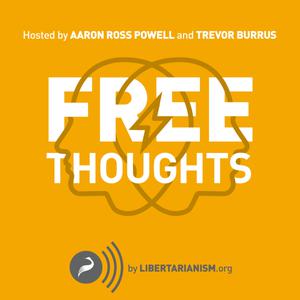
Free Thoughts
Libertarianism.org
A Show about Politics and Ideas
- 3 minutes 14 secondsComing Soon: The Liberty ExchangeComing soon, a brand new podcast from Libertarianism.org...
Hosted on Acast. See acast.com/privacy for more information.
2 October 2023, 12:00 am - 52 minutes 34 secondsFighting Government Secrecy (with Patrick Eddington)
The Jones Act biases American shippers and shipbuilders at the expense of international competition, passing higher prices onto consumers and kneecapping free trade. The Cato Institute (and others) have been urging the government to reform this protectionist policy for several years now. But new findings prompt us to ask; how could such an ordinary task for a think tank constitute treason?
Cato Institute Senior Fellow Patrick Eddington joins Trevor today to explain how the Freedom of Information Act (FOIA) sheds light onto the dark and hidden memos, documents, and recommendations shuffled between bureaucrats behind closed doors—when it can. But how did FOIA come about? What is the process involved? And how do agencies avoid complying with requests?
Hosted on Acast. See acast.com/privacy for more information.
21 October 2022, 8:00 am - 46 minutes 9 secondsWhen Is Democracy Undemocratic? (with Emily B. Finley)
The rise of global populism reveals a tension in Western thinking about democracy. Warnings about the "populist threat" to democracy and "authoritarian" populism are now commonplace. However, as Emily B. Finley argues in The Ideology of Democratism, dismissing "populism" as anti-democratic is highly problematic. In effect, such arguments essentially reject the actual popular will in favor of a purely theoretical and abstract "will of the people."
On today’s episode, Emily Finley and Trevor sit down to trace a line from Jean-Jacques Rousseau and Thomas Jefferson to Woodrow Wilson and John Rawls, point out the flaws in deliberative democratic practices, and try to find a way to conceive of a better democratism—one without mob rule.
Hosted on Acast. See acast.com/privacy for more information.
14 October 2022, 8:00 am - 49 minutes 45 secondsFloods, Nuclear Power, and Wages (with Peter Van Doren)
The illustrious, ingenious, notorious PVD is back with us once again. Today, he and Trevor sit down to discuss dilemmas of flood damages following Hurricane Ian, the viability of subsidies for nuclear energy, and minimum wage increase’s effects on workers’ wages.
Peter references the following:
The National Flood Insurance Program: Solving Congress’s Samaritan’s Dilemma by Peter Van Doren
Hurricane Ian’s Toll Is Severe. Lack of Insurance Will Make It Worse.
Subsidies to Nuclear Power in the Inflation Reduction Act by David Kemp and Peter Van Doren
How Important are Minimum Wage Increases in Increasing the Wages of Minimum Wage Workers? by Jeffrey Clemens and Michael R. Strain
Hosted on Acast. See acast.com/privacy for more information.
7 October 2022, 8:00 am - 52 minutes 17 secondsHow the 14th Amendment Changed America (with Randy Barnett and Evan Bernick)
Adopted in 1868, the Fourteenth Amendment profoundly changed the Constitution, giving the federal judiciary and Congress new powers to protect the fundamental rights of individuals from being violated by the states. Yet, according to Randy Barnett and Evan Bernick in their new book The Original Meaning of the Fourteenth Amendment: Its Letter and Spirit, the Supreme Court has long misunderstood or ignored the original meaning of the amendment’s key clauses, covering the privileges and immunities of citizenship, due process of law, and the equal protection of the laws.
On today’s episode, they join us to answer questions as simple as; what is the fourteenth amendment, and why is it possibly one of our most important? As well as more complex ones, including; does the equal protection clause guarantee positive rights? And what can libertarians learn from the anti-slavery Republicans who wrote the 14th Amendment?
Hosted on Acast. See acast.com/privacy for more information.
30 September 2022, 8:00 am - 55 minutes 38 secondsFree Market: The History of an Idea (with Jacob Soll)After two government bailouts of the US economy in less than twenty years, free market ideology is due for serious reappraisal. In his new book Free Market: The History of an Idea, MacArthur Fellow and USC professor Jacob Soll details how we got to this current crisis, and how we can find our way out by looking to earlier iterations of free market thought. He helps us answer questions such as; what role did early market theorists believe that states had in building and maintaining free markets? How do many get John Stuart Mill, John Locke, and Adam Smith wrong? And what do stoicism, Christianity, friendship, and love have to do with free markets?
Hosted on Acast. See acast.com/privacy for more information.
23 September 2022, 8:00 am - 53 minutes 13 secondsCan Public Schools Work? (with Neal McCluskey)
American public schooling was established to unify diverse people and prepare citizens for democracy. Intuitively, it would teach diverse people the same values, preferably in the same buildings, with the goal that they will learn to get along and uphold government by the people. But intuition can be wrong; significant evidence suggests that public schools have not brought diverse people together, whether from legally mandated racial segregation, espousing values many people could not accept, or human beings simply tending to associate with others like themselves.
Neal McCluskey, Director of the Cato Institute’s Center for Educational Freedom and author of the forthcoming book The Fractured Schoolhouse: Reexamining Education for a Free, Equal, and Harmonious Society, joins the show today to explain how the fear of community balkanization, the panic over critical race theory and “gender ideology”, and reactions to the COVID-19 crisis have only further driven rifts between the right and left on the topic of education. But how many of these are new problems, and how many are simply old ones in new forms? In the end, we may be forced to ask; is the intractable problem of not agreeing on what “our” children should learn solvable? And if not, is funding public education even worth it?
Hosted on Acast. See acast.com/privacy for more information.
16 September 2022, 8:00 am - 53 minutes 4 secondsWhy More People Means More Wealth (with Marian Tupy and Gale Pooley)
Generations of people have been taught that population growth makes resources scarcer. In 2021, for example, one widely publicized report argued, “The world's rapidly growing population is consuming the planet's natural resources at an alarming rate . . . the world currently needs 1.6 Earths to satisfy the demand for natural resources . . . [a figure that] could rise to 2 planets by 2030.” But is that true?
Today’s guests, Marian Tupy and Gale Pooley, authors of the new book Superabundance: The Story of Population Growth, Innovation, and Human Flourishing on an Infinitely Bountiful Planet analyzed the prices of hundreds of commodities, goods, and services spanning two centuries, and found that resources became more abundant as the population grew. The two sit down with Trevor to answer questions like; how can we innovate enough to cover the resources needed for 8 billion people? How sustainable is our current mode of sustained innovation? And how is the total sum of atoms different than the sum total of knowledge?
Hosted on Acast. See acast.com/privacy for more information.
9 September 2022, 8:00 am - 51 minutes 18 secondsRacial Classification in America (with David Bernstein)
Americans are understandably squeamish about official racial and ethnic classifications. Nevertheless, they are ubiquitous in American life. Applying for a job, mortgage, university admission, citizenship, government contracts, and much more involves checking a box stating whether one is Black, White, Asian, Hispanic, or Native American.
David Bernstein’s new book, Classified: The Untold Story of Racial Classification in America, attempts to illuminate these “crude classifications”, showing how the government’s formalizing and flattening of racial categories led to the forming of new interest groups, anti-discrimination policy, and complicated, ever-evolving definitions. But rather than attack affirmative action, it asks: if we’re going to classify people by race, what is the goal? How do the tools we use to do so accomplish it? And what can we do going forward to do so in a better way?
Hosted on Acast. See acast.com/privacy for more information.
2 September 2022, 8:00 am - 56 minutes 10 secondsThe Statrix: How Government Warps Our Perception of the World (Rerun)
We’re taking a break this week, but in the meantime, enjoy this treasure from the Free Thoughts vault where Trevor explains the “Statrix”, how government warps our perception of the world around us, and how it disproportionately affects the poor.
Trevor mentions the recent spate of track problems and fires that have been plaguing Washington D.C.‘s metro system, which led to the creation of this website, ismetroonfire.com. He also explains this song by the Kingston Trio, which was meant to a protest fare increases on Boston’s public subway system.Here’s a series of articles by Megan McArdle on Washington D.C.‘s streetcar project, written in 2009, 2014, and 2015 (the project was originally slated to be completed in 2006 and is still not fully rolled out today, in 2016). Trevor also mentions our podcast episode with Randal O’Toole, “Transportation, Land Use, and Freedom,” James Tooley’s book “The Beautiful Tree: A Personal Journey Into How the World’s Poorest People are Educating Themselves,” and NeuCare, a new way to think about medical care.
Hosted on Acast. See acast.com/privacy for more information.
26 August 2022, 8:00 am - 1 hour 1 minuteChasing the Scream: The First and Last Days of the Drug War (with Johann Hari)We’re taking a break this week, but in the meantime, enjoy this treasure from the Free Thoughts vault with writer and journalist Johann Hari to discuss his book Chasing the Scream: The First and Last Days of the War on Drugs. In it, he seeks to answer questions such as; what was the U.S. government’s original motivation behind drug prohibition? How has the way we view addiction changed over time? What happens when a country—or a state—decriminalizes drugs? What about hard drugs?
Hosted on Acast. See acast.com/privacy for more information.
19 August 2022, 8:00 am - More Episodes? Get the App
Your feedback is valuable to us. Should you encounter any bugs, glitches, lack of functionality or other problems, please email us on [email protected] or join Moon.FM Telegram Group where you can talk directly to the dev team who are happy to answer any queries.
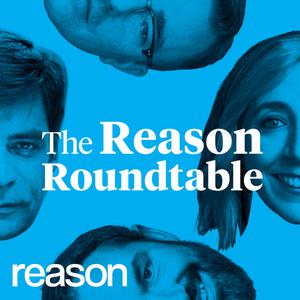 The Reason Roundtable
The Reason Roundtable
 EconTalk
EconTalk
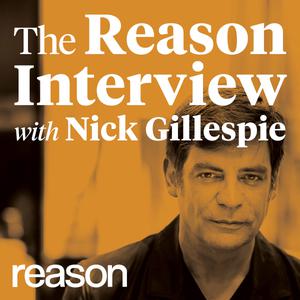 The Reason Interview With Nick Gillespie
The Reason Interview With Nick Gillespie
 The Soho Forum Debates
The Soho Forum Debates
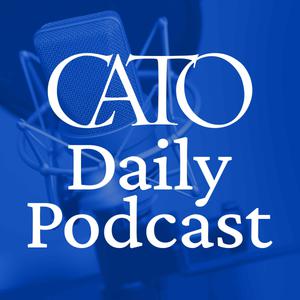 Cato Daily Podcast
Cato Daily Podcast
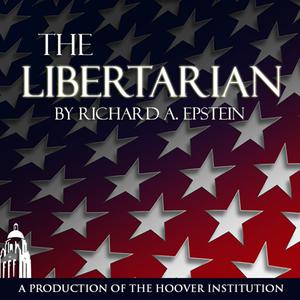 Libertarian
Libertarian